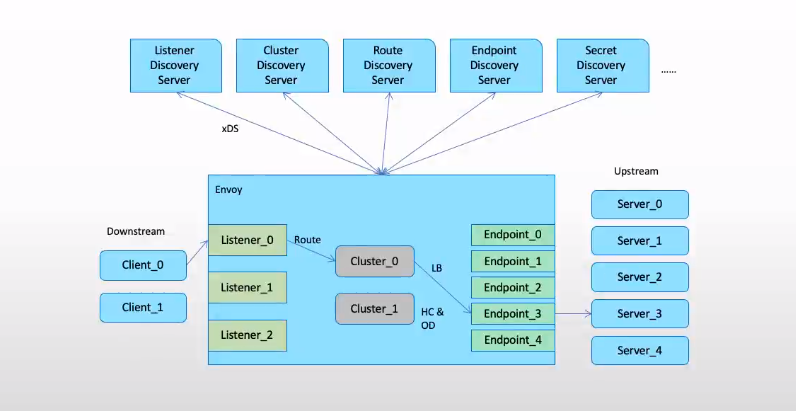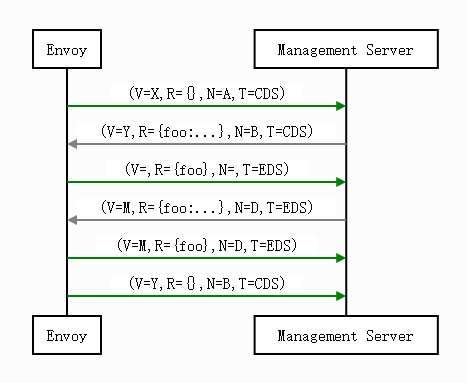Envoy xDS API基础
动态配置
-
xDS API为Envoy提供了资源的动态配置机制,它也被称为Data Plane API;
-
Envoy支持三种类型的配置信息的动态发现机制,相关的发现服务及其相应的API联合起来称为xDSAPI;
-
基于文件系统发现:指定要监视的文件系统路径
- 通过查询一到多个管理服务器(Management Server)发现:通过DiscoveryRequest协议报文发送请求,并要求服务方以DiscoveryResponse协议报文进行响应
-
gRPC服务:启动gRPC流
-
REST服务:轮询REST-JSON URL
-
-
- 文件后缀名为conf,则资源要以json格式定义;文件后缀名为yaml,则资源需要以yaml格式定义;另外,动态配置中,各Envoy实例需要有惟的id标识;
-
v3 xDS支持如下几种资源类型
xDS API概述
Envoy对xDS API的管理由后端服务器实现,包括LDS、CDS、RDS、SRDS(Scoped Route)、VHDS(Virtual Host)、EDS、SDS、RTDS(Runtime)等;
-
所有这些API都提供了最终的一致性,并且彼此间不存在相互影响;
- 部分更高级别的操作(例如执行服务的A/B部署)需要进行排序以防止流量被丢弃,因此,基于一个管理服务器提供多类API时还需要使用聚合发现服务(ADS)API;
-
ADS API允许所有其他API通过来自单个管理服务器的单个gRPC双向流进行编组,从而允许对操作进行确定性排序;
-
-
另外,xDS的各API还支持增量传输机制,包括ADS;

Bootstrap node 配置段
配置说明
一个Management Server实例可能需要同时响应多个不同的Envoy实例的资源发现请求
-
Management Server上的配置需要为适配到不同的Envoy实例
-
Envoy实例请求发现配置时,需要在请求报文中上报自身的信息
-
例如id、cluster、metadata和locality等
-
这些配置信息定义在Bootstrap配置文件中
-
专用的顶级配置段“node{…}”
-
-
配置格式
node:
id: … # An opaque node identifier for the Envoy node.
cluster: … # Defines the local service cluster name where Envoy is running.
metadata: {…} # Opaque metadata extending the node identifier. Envoy will pass this directly to the management server.
locality: # Locality specifying where the Envoy instance is running.
region: …
zone: …
sub_zone: …
user_agent_name: … # Free-form string that identifies the entity requesting config. E.g. “envoy” or “grpc”
user_agent_version: … # Free-form string that identifies the version of the entity requesting config. E.g. “1.12.2” or “abcd1234” , or “SpecialEnvoyBuild”
user_agent_build_version: # Structured version of the entity requesting config.
version: …
metadata: {…}
extensions: [ ] # List of extensions and their versions supported by the node.
client_features: [ ]
listening_addresses: [ ] # Known listening ports on the node as a generic hint to the management server for filtering listeners to be returned.API 流程
- 对于典型的HTTP路由方案,xDS API的Management Server需要为其客户端(Envoy实例)配置的核心资源类型为Listener、RouteConfiguration、Cluster和ClusterLoadAssignment四个;
- 每个Listener资源可以指向一个RouteConfiguration资源,该资源可以指向一个或多个Cluster资源,并且每个Cluster资源可以指向一个ClusterLoadAssignment资源;
- Envoy实例在启动时请求加载所有Listener和Cluster资源,而后,再获取由这些Listener和Cluster所依赖的RouteConfiguration和ClusterLoadAssignment配置;
- 此种场景中,Listener资源和Cluster资源分别代表着客户端配置树上的“根(root)”配置,因而可并行加载;
- 类型gRPC一类的非代理式客户端可以仅在启动时请求加载其感兴趣的Listener资源,而后再加载这些特定Listener相关的RouteConfiguration资源;再然后,是这些RouteConfiguration资源指向的Cluster资源,以及由这些Cluster资源依赖的ClusterLoadAssignment资源;
-
该种场景中,Listener资源是客户端整个配置树的“根”;
-
Envoy资源的配置源
- 配置源(ConfigSource)用于指定资源配置数据的来源,用于为Listener、Cluster、Route、Endpoint、Secret和VirtualHost等资源提供配置数据;
-
目前,Envoy支持的资源配置源只能是path、api_config_source或ads其中之一;
-
api_config_source或ads的数据来自于xDS API Server,即Management Server;
基于文件系统的订阅
基于文件系统的订阅说明
-
为Envoy提供动态配置的最简单方法是将其放置在ConfigSource中显式指定的文件路径中
- Envoy将使用inotify(Mac OS X上的kqueue)来监视文件的更改,并在更新时解析文件中的DiscoveryResponse报文
-
二进制protobufs,JSON,YAML和proto文本都是DiscoveryResponse所支持的数据格式
- 除了统计计数器和日志以外,没有任何机制可用于文件系统订阅ACK/NACK更新。除了统计计数器和日志以外,没有任何机制可用于文件系统订阅ACK/NACK更新。
基于文件系统的订阅EDS配置示例
以EDS为例,Cluster为静态定义,其各Endpoint通过EDS动态发现;
Cluster定义格式
# Cluster中的endpoint配置格式
clusters:
- name:
...
eds_cluster_config:
service_name:
eds_config:
path: ... # ConfigSource,支持使用path, api_config_source或ads三者之
path_config_source: {...}
api_config_source: {...}
ads: {...}
initial_fetch_timeout: {...}
resource_api_version: ...Cluster配置示例
# 新格式的配置
clusters:
- name: targetCluster
connect_timeout: 0.25s
lb_policy: ROUND_ROBIN
type: EDS
eds_cluster_config:
service_name: webcluster
eds_config:
path: '/etc/envoy/eds.conf' # 指定订阅的文件路径基于文件系统的订阅LDS和CDS配置示例
LDS和CDS配置示例说明
-
各Listener的定义以Discovery Response的标准格式保存于一个文件中;
-
各Cluster的定义同样以Discovery Response的标准格式保存于另一文件中;
Envoy Bootstrap配置示例
node:
id: envoy_front_proxy
cluster: MageEdu_Cluster
admin:
profile_path: /tmp/envoy.prof
access_log_path: /tmp/admin_access.log
address:
socket_address:
address: 0.0.0.0
port_value: 9901
dynamic_resources:
lds_config:
path: /etc/envoy/conf.d/lds.yaml
cds_config:
path: /etc/envoy/conf.d/cds.yamllds.yaml
查看代码
resources:
- "@type": type.googleapis.com/envoy.config.listener.v3.Listener
name: listener_http
address:
socket_address: { address: 0.0.0.0, port_value: 80 }
filter_chains:
- filters:
name: envoy.http_connection_manager
typed_config:
"@type": type.googleapis.com/envoy.extensions.filters.network.http_connection_manager.v3.HttpConnectionManager
stat_prefix: ingress_http
route_config:
name: local_route
virtual_hosts:
- name: local_service
domains: ["*"]
routes:
- match:
prefix: "/"
route:
cluster: webcluster
http_filters:
- name: envoy.filters.http.routercds.yaml
查看代码
resources:
- "@type": type.googleapis.com/envoy.config.cluster.v3.Cluster
name: webcluster
connect_timeout: 1s
type: STRICT_DNS
load_assignment:
cluster_name: webcluster
endpoints:
- lb_endpoints:
- endpoint:
address:
socket_address:
address: webserver01
port_value: 8080
- endpoint:
address:
socket_address:
address: webserver02
port_value: 8080gRPC订阅
gRPC订阅说明
- Enovy支持为每个xDS API独立指定gRPC ApiConfigSource,它指向与管理服务器对应的某上游集群;
- 这将为每个xDS资源类型启动一个独立的双向gRPC流,可能会发送给不同的管理服务器
- 每个流都有自己独立维护的资源版本,且不存在跨资源类型的共享版本机制;
- 在不使用ADS的情况下,每个资源类型可能具有不同的版本,因为Envoy API允许指向不同的EDS/RDS资源配置并对应不同的ConfigSources;
-
API的交付方式采用最终一致性机制;
基于gRPC的动态配置说明
- 以LDS为例,它配置Listener以动态方式发现和加载,而内部的路由可由发现的Listener直接提供,也可配置再经由RDS发现;
- 提供gRPC API服务的Management Server(控制平面)也需要定义为Envoy上的集群,并由envoy实例通过xDS API进行请求;
-
通常,这些管理服务器需要以静态资源的格式提供;
-
类似于,DHCP协议的Server端的地址必须静态配置,而不能经由DHCP协议获取;
-
基于gRPC的动态配置格式
dynamic_resouces:
lds_config:
api_config_source:
api_type: ... # API可经由REST或gRPC获取,支持的类型包括REST、gRPC和delta_gRPC
resource_api_version: ... # xDS资源的API版本,对于1.19及之后的Envoy版本,要使用v3;
rate_limit_settings: {...} # 速率限制
grpc_services: # 提供grpc服务的一到多个服务源
transport_api_version: ... # xDS传输协议使用的API版本,对于1.19及之后的Envoy版本,要使用v3;
envoy_grpc: # Envoy内建的grpc客户端,envoy_grpc和google_grpc二者仅能用其一;
cluster_name: ... # grpc集群的名称;
google_grpc: # Google的C++ grpc客户端
timeout: ... # grpc超时时长;基于gRPC管理服务器订阅LDS和CDS配置示例
基于gRPC的订阅功能需要向专用的Management Server请求配置信息。
front-envoy.yaml
查看代码
node:
id: envoy_front_proxy
cluster: webcluster
admin:
profile_path: /tmp/envoy.prof
access_log_path: /tmp/admin_access.log
address:
socket_address:
address: 0.0.0.0
port_value: 9901
dynamic_resources:
lds_config:
resource_api_version: V3
api_config_source:
api_type: GRPC
transport_api_version: V3
grpc_services:
- envoy_grpc:
cluster_name: xds_cluster
cds_config:
resource_api_version: V3
api_config_source:
api_type: GRPC
transport_api_version: V3
grpc_services:
- envoy_grpc:
cluster_name: xds_cluster
static_resources:
clusters:
- name: xds_cluster
connect_timeout: 0.25s
type: STRICT_DNS
typed_extension_protocol_options:
envoy.extensions.upstreams.http.v3.HttpProtocolOptions:
"@type": type.googleapis.com/envoy.extensions.upstreams.http.v3.HttpProtocolOptions
explicit_http_config:
http2_protocol_options: {}
lb_policy: ROUND_ROBIN
load_assignment:
cluster_name: xds_cluster
endpoints:
- lb_endpoints:
- endpoint:
address:
socket_address:
address: my-control-plane
port_value: 18000config.yaml
查看代码
name: myconfig
spec:
listeners:
- name: listener_http
address: 0.0.0.0
port: 80
routes:
- name: local_route
prefix: /
clusters:
- webcluster
clusters:
- name: webcluster
endpoints:
- address: 172.31.15.11
port: 80ADS
ADS说明
交互顺序保证MS资源分发时的流量丢弃是一项很有挑战的工作,而ADS允许单一MS通过单个gRPC流提供所有的API更新;
-
配合仔细规划的更新顺序,ADS可规避更新过程中流量丢失
- 使用 ADS,在单个流上可通过类型 URL 来进行复用多个独立的DiscoveryRequest/DiscoveryResponse 序列

ADS配置示例
查看代码
node:
# set <cluster identifier>
cluster: envoy_cluster
# set <node identifier>
id: envoy_node
dynamic_resources:
ads_config:
api_type: GRPC
transport_api_version: V3
grpc_services:
- envoy_grpc:
cluster_name: ads_cluster
cds_config:
resource_api_version: V3
ads: {}
lds_config:
resource_api_version: V3
ads: {}
static_resources:
clusters:
- name: ads_cluster
type: STRICT_DNS
load_assignment:
cluster_name: ads_cluster
endpoints:
- lb_endpoints:
- endpoint:
address:
socket_address:
# set <ADS management server address>
address: my-control-plane
# set <ADS management server port>
port_value: 777
# It is recommended to configure either HTTP/2 or TCP keepalives in order to detect
# connection issues, and allow Envoy to reconnect. TCP keepalive is less expensive, but
# may be inadequate if there is a TCP proxy between Envoy and the management server.
# HTTP/2 keepalive is slightly more expensive, but may detect issues through more types
# of intermediate proxies.
typed_extension_protocol_options:
envoy.extensions.upstreams.http.v3.HttpProtocolOptions:
"@type": type.googleapis.com/envoy.extensions.upstreams.http.v3.HttpProtocolOptions
explicit_http_config:
http2_protocol_options:
connection_keepalive:
interval: 30s
timeout: 5s
upstream_connection_options:
tcp_keepalive: {}REST-JSON轮询订阅
REST-JSON轮询订阅说明
-
通过REST端点进行的同步(长)轮询也可用于xDS单例API
-
上面的消息顺序是类似的,除了没有维护到管理服务器的持久流
-
预计在任何时间点只有一个未完成的请求,因此响应nonce在REST-JSON中是可选的
-
proto3的JSON规范转换用于编码DiscoveryRequest和DiscoveryResponse消息
-
ADS不适用于REST-JSON轮询
- 当轮询周期设置为较小的值时,为了进行长轮询,则还需要避免发送DiscoveryResponse,除非发生了对底层资源的更改
基于REST管理服务器订阅配置格式
提供REST API服务的管理服务器也需要定义为Envoy上的集群,并由LDS等相关的动态发现服务进行调用;但这些管理服务器需要以静态配置的格式提供;
dynamic_resources:
lds_config:
resource_api_version: … # xDS资源配置遵循的API版本,v1.19版本及以后仅支持V3 ;
api_config_source:
transport_api_version: ... # xDS传输协议中使用API版本,v1.19版本及以后仅支持V3;
api_type: ... # API可经由REST或gRPC获取,支持的类型包括REST、GRPC和DELTA_GRPC
cluster_names: ... # 提供服务的集群名称列表,仅能与REST类型的API一起使用;多个集群用于冗余之目的,故障时将循环访问;
refresh_delay: ... # REST API轮询时间间隔;
request_timeout: ... # REST API请求超时时长,默认为1s;基于REST管理服务器订阅配置示例
查看代码
node:
# set <cluster identifier>
cluster: envoy_cluster
# set <node identifier>
id: envoy_node
dynamic_resources:
cds_config:
resource_api_version: V3
api_config_source:
api_type: REST
transport_api_version: V3
refresh_delay: {nanos: 500000000} # 1/2s
cluster_names:
- xds_cluster
lds_config:
resource_api_version: V3
api_config_source:
api_type: REST
transport_api_version: V3
refresh_delay: {nanos: 500000000} # 1/2s
cluster_names:
- xds_cluster
static_resources:
clusters:
- name: ads_cluster
type: STRICT_DNS
load_assignment:
cluster_name: ads_cluster
endpoints:
- lb_endpoints:
- endpoint:
address:
socket_address:
address: my-control-plane
port_value: 777参考文档
https://www.envoyproxy.io/docs/envoy/latest/api-docs/xds_protocol#xds-protocol
https://www.envoyproxy.io/docs/envoy/latest/configuration/overview/xds_api#v3-grpc-streaming-endpoints
https://www.envoyproxy.io/docs/envoy/latest/configuration/overview/mgmt_server


 浙公网安备 33010602011771号
浙公网安备 33010602011771号